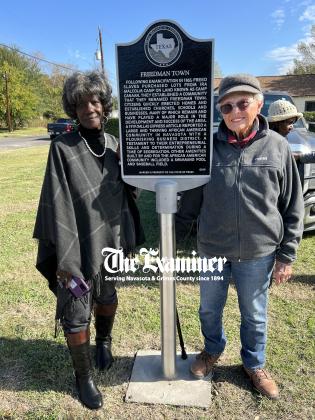Dedication of historical Freedman Town
By Matthew Ybarra
Managing editor
Two River’s Heritage Foundation was awarded a historical marker from Texas Historical Commission marking the site of Historic Freedman town in Navasota. The dedication ceremony was held Thursday, Nov. 17, at Friendship Baptist Church.
The marker sits on the church grounds facing South LaSalle Street near the Davis Street intersection. Historic Freedman Town was established by well-known Ira Malcolm Camp in 1866. Camp had 130 acres surveyed and divided in what he called South Navasota into lots. The sale of Camp’s lots began with several purchased by white citizens near Washington Avenue.
Following the emancipation in 1865, African American freed slaves purchased a majority of Camp’s lots referred to as ‘Camp Canaan’ at a private sale. It was later referred to as ‘Cannon,’ then became known as Freedman Town.
Carolyn Bessellieu, who was instrumental in obtaining the historical marker led the dedication ceremony. “When the Civil War was over, millions of African Americans had nowhere to go,” explained Bessellieu. “There were some who stayed on the plantation and worked, but there were others who chose to find their way.”
Bessillieu explained the mentality of those who settled in Freedman Town. “They had hopes, they had dreams, and they did not want to live their life in a plantation. They had already been there 400 years. It was time to step out. It was time to be a politician, to build their own house. And that is what they did. When they came to Navasota, they saw opportunity.”
J.M Gibbs built and kept a store several months as businesses were built in Camp Canaan. Dr. A. P. Gart built a large hotel. Nelson Jones operated a blacksmith shop and he and Dr. Hill also kept a store. Jerry Reinhardt, the founder of the African American George Washington Carver School, operated a silver smith shop. James Hampshire and John Scott built a steam mill, a gin and a cotton press in 1873.
Freedman Town basically extended south from Johnson Street roughly a couple blocks each side of South LaSalle to where the George Washington Carver School is located and the railroad tracks.
The historical marker reads, ‘They established a community that they renamed Freedman Town. Citizens quickly erected homes and established churches, schools and businesses, many of which have remained and have played a major role in the development and success of the area.’ The words on the marker continue, ‘A 1919 Dallas Express Article reported a large and thriving African American Community in Navasota with a flourishing business district, a testament to their entrepreneurial skills and determination during a time of segregation. Other amenities built for the African American Community included a swimming pool and baseball field.’
“This is a really important day, and this is a really great thing for Navasota in dedicating history,” stated Navasota Mayor Bert Miller. He said many may not know the history of Freedman Town, but this marker helps preserve that history and is perfectly located for not only locals, but for tourists to enjoy and learn the history.
Grimes County Commissioner Barbara Walker shared a few words at the dedication. “This is a momentous occasion because Grimes County has a rich history and Freedman Town was a great part of that history. It is important that we know, and we acknowledge our forefather’s work and contributions to this great city. This city is becoming a destination, but it was also a destination at that time.”
Walker said she is proud to be part of a rich African American legacy that occupied eight seats in the State Legislature between 1871 and 1883. “It is important that we remember and learn the struggle and the victory that has paved the way for a thriving community,” explained Walker.
Bessellieu also thanked Betty Dunn, who she said has been her mentor and a vital part of helping to obtain the historical marker and have it erected.


